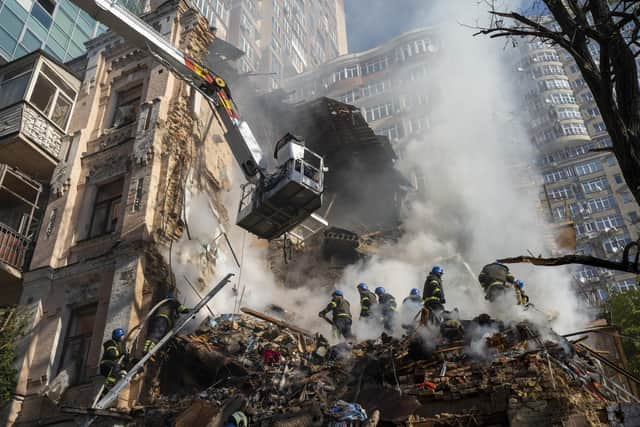Ukraine conflict: Major elements of Russia’s military leadership 'increasingly dysfunctional' - MoD
The latest intelligence update from the Ministry of Defence (MoD) comes as Russian airstrikes in Ukraine continue. Strikes have cut power and water supplies to hundreds of thousands of Ukrainians, part of what the country’s president called an expanding Russian campaign to drive the nation into the cold and dark and make peace talks impossible.
President Volodymyr Zelensky said nearly a third of Ukraine’s power stations have been destroyed in the past week, “causing massive blackouts across the country”.
Advertisement
Hide AdAdvertisement
Hide AdDepriving people of water, electricity and heat as winter begins to bite, and the broadening use of so-called suicide drones that nosedive into targets, have opened a new phase in Russian President Vladimir Putin’s war. The bombardments appear aimed at wearing down the notable resilience Ukrainians have shown in the nearly eight months since Moscow invaded. Across Ukraine, even far from front lines, basic utilities are no longer certainties, with daily Russian strikes reaching far into the country and damaging key facilities.
However, the MoD state in their latest intelligence report that the change in strategy could also be due to a shortage of capable officers and low morale throughout the Russian ranks.
The update from the MoD reads: "Eight months into the invasion, major elements of Russia’s military leadership are increasingly dysfunctional. At the tactical level, there is almost certainly a worsening shortage of capable Russian junior officers to organise and lead newly mobilised reservists.
"Eyewitness testimony suggests that the shooting of 11 Russian soldiers near Belgorod by a fellow recruit on 15 October 2022 occurred after an officer’s abusive comments towards ethnic minority recruits.


"Poor lower-level leadership is likely worsening the low morale and poor unit cohesion in many parts of the Russian force.”
It adds: “Four of the five generals with direct operational command of elements of the invasion in February 2022 have now been dismissed. Their replacements have so far done little to improve Russia’s battlefield performance.
"The lack of command continuity will likely be more disruptive than in a Western military because under Russian doctrine the development of plans sits largely with the commander personally, rather than as a collective effort across a broader staff.”